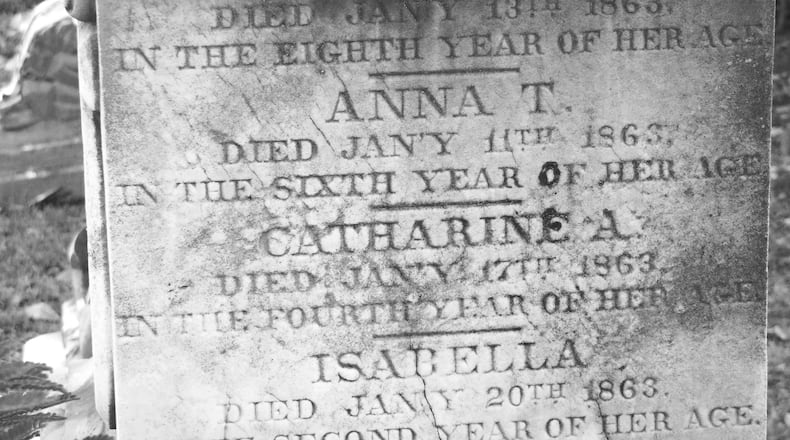Take a look at the accompanying photograph. This monument is in the Bloomfield family burial plot at Historic Oakland Cemetery in Atlanta. A close examination shows that the Bloomfields had four daughters, ages 8, 6, 4 and 2.
All four died of diphtheria in the 1860s -- within 10 days of the first presence of the disease in the family.
Diphtheria is a highly contagious respiratory disease that annually took the lives of hundreds of thousands of children in the U.S. and worldwide until a safe vaccine was developed in the 1920s (Alaskans may recall that the origin of the Iditarod was the 1925 dogsled race to get the diphtheria antitoxin to Nome in the wake of a winter outbreak in that small community).
The Bloomfield memorial and many more like it at Oakland and other older cemeteries illustrate the tragic deaths of children (and adults) from acute infectious diseases in the 19th and early 20th centuries when vaccines to combat these scourges had not yet been developed.
Nearly 30% of the interments at Oakland - which was established in 1850 - are children. Many died from diphtheria, typhoid fever, tetanus, pertussis (whooping cough) and other acute illnesses. These graves are a heartbreaking testament to the fragility of life in that era.
Credit: contributed
Credit: contributed
Today, American children and many across the industrial world have little to fear from these dreaded diseases due to the wide availability of the DPT (Diphtheria-Pertussis-Tetanus] and the MMR (Measles-Mumps-Rubella) vaccines that are mandated for all children before entering public school.
In addition, those of us who grew up in the 1940s and 1950s remember well the agonizing photographs of children and adults confined to iron lungs after contracting infantile paralysis (polio) -- the same disease that made an invalid of President Franklin D. Roosevelt after he contracted the disease in 1921. Years of research, much of it funded through the March of Dimes, finally yielded two effective treatments for the debilitating illness -- the Salk vaccine shot or the Sabin oral vaccine on a sugar cube.
All of these vaccines have nearly eradicated those dreadful diseases; but they continue to lurk in the environment ready to attack again if we let our guard down.
Sadly, there are many among us who eschew the extraordinary value, safety and efficacy of vaccines in providing safe and healthy communities. Now, there are even some political figures who are actually calling for the repeal of all vaccine mandates. Do these people actually want to go back a century in time to when so many died from what are now treatable diseases?
Hard to imagine we, as a society, could be so ignorant of the past and the remarkable progress we have made.
Ren Davis is a retired healthcare executive, ethicist and longtime volunteer at Historic Oakland Cemetery in Atlanta.
About the Author
Keep Reading
The Latest
Featured



